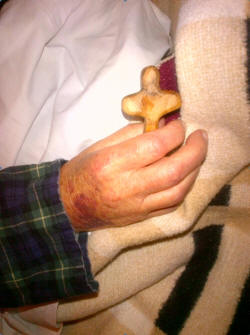Rebuilding excellent palliative care.
 NICE
recently consulted on best practice in end of life care. Members of our
Association have been worried about the use of the term “End of Life Care”
which carries with it in the public’s mind an expectation that death is
the key outcome. Of course, best palliation and quality of care and life
during palliation are the central issues upon which all clinicians must
focus. Palliative care seems therefore a far better and less misleading
term. In the wake of the Liverpool Care Pathway, palliative care needs to
be rebuilt in terms of quality especially, perhaps, in our acute
hospitals.
NICE
recently consulted on best practice in end of life care. Members of our
Association have been worried about the use of the term “End of Life Care”
which carries with it in the public’s mind an expectation that death is
the key outcome. Of course, best palliation and quality of care and life
during palliation are the central issues upon which all clinicians must
focus. Palliative care seems therefore a far better and less misleading
term. In the wake of the Liverpool Care Pathway, palliative care needs to
be rebuilt in terms of quality especially, perhaps, in our acute
hospitals.
NICE’s consultation pointed out elegantly that the diagnosis of dying and prediction of death is very difficult to do, with poor quality evidence in almost every study they cited. And they accepted that with the evidence base mostly around cancer, the prediction of death in frailty, dementia and respiratory or cardiac failure is especially hard to do. But then they carried on with recommendations based upon the ability to diagnose dying reliably and well.
We will publish more on this in the February Quarterly. In our submission, the CMA emphasized the imperative of responding need to provide treatments based upon needs rather than prognosis.
The CMA said:
“One of our greatest worries is that the guideline still focuses upon the belief that the diagnosis of dying can be accurately and safely made,” said a submission by the CMA to Nice this week.
“It is very clear that this is difficult with evidence that the diagnosis of dying is especially difficult in dementia, heart failure and respiratory failure,” the submission said.
“The guidance … should flow from the overarching principle that treatment should be based upon need and not prognosis,” the CMA submission said.
“Palliative care should be based upon the relief of symptoms and the needs of the individual patient and not merely on the premise that the clinician thinks someone is dying.
“We advise that the Guideline Development Group should state clearly that the diagnosis of dying is inaccurate. The safest course in terms of patient outcome and the available evidence is that palliative care should be based upon need and not prognosis.”
Our 2016 Annual Conference will be on Rebuilding Palliative Care and in London. More details in the February Quarterly.
